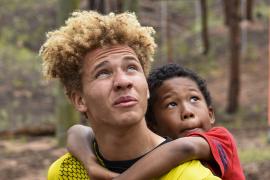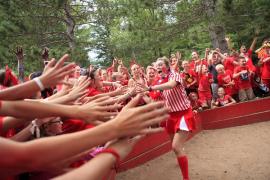Camps continue to face recruitment and hiring challenges. As we work independently and collaboratively to connect with potential staff members, it is important to make sure they truly understand the value of working at summer camp. While salary is important, many of today’s teens and young adults are focused on making an impact. They want to make a meaningful contribution. But they also want to be sure their jobs, internships, and similar opportunities are truly having a positive impact on them.
Summer camp professionals know the benefits of working at summer camp. The skills developed, the experience gained . . . the overall growth and development we see in our staff each summer is incredible. We often discuss skills like communication and leadership when we talk about the skills developed while working at camp. However, the benefits of being a summer camp counselor goes well beyond these surface level skills. Working at summer camp provides teens and young adults with the opportunity to develop work ethic, empathy, open-mindedness, and overall awareness of their impact on others.
The Values of Summer Camp
Many summer camps have established values like community, respect, etc. We work to educate our counselors about our specific camp values each summer. Counselors embody summer camp values as they complete the daily work of camp. They model and instill these camp values for others as well. With each day the values of summer camp become a part of who our counselors are.
There’s another layer of values gained while working at summer camp. These are the highly sought values and skills of ethics, empathy, open-mindedness, and inclusion. Many counselors come to camp never having had a “real job” before. They are “green” and eager to learn. Summer camps have a huge opportunity to instill these important and highly desirable values and skills in our counselors and staff. Additionally, summer camps need to ensure people, businesses, and organizations outside of the camp industry understand that camp counselors return home each summer having developed these skills.
Camp Counselor Skills Are Professional Skills
Recent research shows an increase in workplace discrimination, with 60 percent of employed Americans experiencing discrimination in 2021. While not directly related, the development of work ethic and related skills like respect, cooperation, and integrity are key in helping reverse these statistics. These skills are highly valued and sought after by employers today. Summer Camps are instilling these values (and many more) throughout the summer. We know this, but do today's young adults (or their parents, counselors, advisors, professors) know that camp counselor skills are professional skills? In many cases the answer is “No.”
The first step in developing these skills during the summer is educating potential applicants of the opportunity. It is important to include this information in job postings, job descriptions, the staff section of your website . . . the list goes on and on. During interviews, discuss prior work experience and how those experiences have helped the applicant develop these skills. If they have no work experience, discuss the skills they would like to gain while working at camp. And discuss how their various responsibilities throughout the summer will not only introduce them to these skills but provide ample opportunities to refine and strengthen these skills.
Developing Work Ethic at Summer Camp
How often do you find yourself saying “They don’t have any work ethic” or “They simply aren’t professional”? Instead of noting the deficient skills as a complaint, we (camp directors, administrators, etc.) have a responsibility of facilitating the development of work ethic at summer camp. We have to actively discuss these skills and our expectations with counselors. We can’t simply think they will learn from our examples.
Explaining expectations like being on time, wearing appropriate clothing and footwear, being respectful of others, and being responsible for one’s actions should be discussed in training. Consequences for not meeting expectations should be in place, and camp directors and other administration must follow-through with enforcing consequences (and then provide further training, reinforcement, and acknowledgement of growth). As counselors learn these expectations and learn from their mistakes, work ethic, professionalism, integrity, and responsibility will become second nature to them. By the end of the summer our “green” counselors will be more capable, confident, and prepared for their future endeavors.
Translating Counselor Skills
Our counselors have gained these important skills, but our job is not done just yet. Just as the counselors may not have had these skills at the start of the summer, they likely don’t have the skills to tell others how camp helped them to develop the skills (or they may not realize they have gained them). We must help our counselors in translating counselor skills to their resumes, interviews, and future workplaces.
In a related blog I outlined an activity to help counselors identify the skills they developed throughout the summer. Additionally, counselors identify specific examples of how they developed and used these skills. At the conclusion of the activity they learn how to translate the work they did throughout the summer into terms and concepts that employers in a variety of industries and career paths would understand.
This critical step in helping counselors translate their counselors skills into professional skills not only helps them have stronger applications, resumes, and interviews. It also reiterates the importance and value of working at summer camp. More individuals will better understand how working at summer camp helps prepare today’s young adults for their futures. And more individuals will seek opportunities to work at camp (and refer their friends, peers, and classmates to do so as well).
Helping teens and young adults, parents, professors, guidance counselors, etc. understand the value of working at camp is key. However, we can’t sell ourselves short and not include skills like work ethic and professionalism when we intentionally build awareness and understanding among various individuals. As we build awareness more people will begin to understand that camp counselor skills are professional skills. And working at camp will one day become a highly sought-after opportunity!
This blog was written on behalf of Project Real Job whose purpose is to support camps in their efforts to recruit, hire, and retain staff.
Alicia DeHart is the associate director at Fernwood Cove, a half-season girls camp in Maine. Her summer camp experience began as a camper, Teen Leader, and summer camp staff member at 4-H Camp in Virginia. As a seasonal camp counselor and activity instructor, she experienced activity development and programming in aquatics, environmental education, and outdoor/adventure education for youth of all ages and backgrounds. Now in her seventeenth year as a camp director, Alicia is passionate about personal growth and professional development of teens and young adults, particularly through summer camp. Alicia can be reached at [email protected].
Photo courtesy of Camp Twin Creeks in West Virginia.
The views and opinions expressed by contributors are their own and do not necessarily reflect the views of the American Camp Association or ACA employees.



